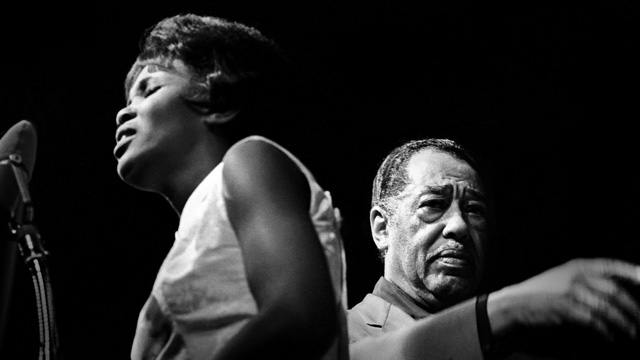San Francisco native Mary Stallings grew up singing gospel in church before moving on to nightclubs and eventually sharing the stage with Dizzy Gillespie, Count Basie, Duke Ellington and other jazz greats. She joins us to talk about her music career and her upcoming shows at SFJAZZ.
Audio Interview Highlights
Text Interview Highlights
On Ella Fitzgerald
"I really met Ella in my late twenties because I traveled with the Basie Band, as you know. We traveled with her many times on different international tours. To see a woman so absolutely gifted in every sense of the word to have such humility –that's what really impressed me. Obviously her music, but the person that she was, she was very humble. And that taught me something. You know, to be that great and to have the humility and the dignity that she possessed was… I don't want to use the word 'child-like' but it came [across as reminiscent of] a child… If she was sad, she would never show it. Her music always expressed such joy."
On What Dizzy Gillespie Had to Do Bring Her Back to Music
"Not very much…. [laughter]… He came to the house when I was with my family, still living at home and saw the community that I was raised under. And he knew that I was an artist, but I was a person who loved family, also. That was very important to me. And he knew that, and he saw it. But he just said 'You know, you can't deny what you are.' He said 'Girl, I got a job for you if you want to take it.' And, you know, he didn't have to twist my arm too much."
On What's Missing in the Fillmore District Now
"The life, the life that was lived. In my mind's eye it was very much the crust of the music scene. I mean, there was everybody. All the hotels, everybody was there. So you don't see that energy that took place with the music, cause the music was that. You know, it was the life. The life that was lived, and being lived in at that time. Now it's more conservative. You don?t see the clubs, at nighttime you don't walk down there or drive down there and see all of the people on the street. It was just?it was music. It was the music."
On Staying Strong in a Tough Industry
"For me, I'm just who I am. What you see is what you get. And as far as achieving, as they say, the great stardom or whatever — maybe you should have that part in your spirit. I just did what I loved. And I knew that in my heart that if you do what you love and you're sincere about it, then you'll be noticed. I was noticed by many great people, but you know, sometimes, it's not in the cards for you. There's something else in my destiny, obviously. And I've had a very fruitful life, and musical career. I did'?t have the big star on top of the building or anything. But sometimes, that doesn't matter. There's something more deep about life and what you do. I don't do it for the gratification of others. I mean, I hope they do get something from it, but first it starts with me. I'm very satisfied with what I'm doing and what I give.
On How She Met Cal Tjader
"We had the Black Hawk, which was a very famous night club on Hyde Street. And I met him there when I was about sixteen, maybe… I used to come to the jam sessions, and jam with all the great musicians, some of the name musicians like Barney Kessel… Cal Tjader happened to be in the studio, in the club, and heard me. And his friend Lonnie Hewitt, the pianist, introduced me to him."
On How Her Singing Has Changed Through the Years
"As you get older you kind of get mellow, you learn you don't have to shout to make people hear you. Like in conversation: nice, soft words, just a kind word, a few words and get on — [People will] get you. You don't have to say a whole bunch of words and talk a bunch of phrases. So yes, the whole way that I sang has changed… You live these things that you try to sing as a young girl. I've lived it, I've seen it. If I didn't live it, I'm looking at others who have."
On Coming From a Musical Family
"The family environment was very powerful because all of my sisters were musicians and went on to study at the Conservatory of Music. [They were] very accomplished pianists, two of my sisters. And they sang… And we joined in a family group together, directed by my mother. We traveled up and down the coast here, singing gospel music. And, I was actually inspired by that from a very early age.
